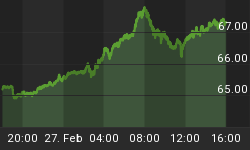The following is commentary that originally appeared at Treasure Chests for the benefit of subscribers on Monday, December 22, 2014.
It's true. The Fed's been talking about raising interest rates since 2010 but never does. Why? Because they can't, which makes their entire act nothing more than bad kabuki theatre while they fallaciously continue to debase 'core economy interests' (think stocks, bonds, currency, etc.) at an increasing rate. An increasing rate? No, that can't be true or gold would be doing much better. Really, it's true - they just hide it better and obfuscate the situation by never talking about it correctly. (i.e. think clandestine money printing that is not included in inflation calculations.) For example, if all the borrowed money that goes into share buybacks were measured in isolation against the float (which is shrinking because of the buybacks), the inflation rate here would be exploding.
Let's do the math and see shall we, since this may be the most important factor in keeping the stock market expanding moving forward. As of the third quarter this year, S&P Fortune 500 Companies will have spent $567 billion on buybacks, up more than 27% year over year, which is 95% of profits, and a full one quarter of the approximately $2 trillion spent on such activities since 2009. Now that's a bubble! I'm sure America's poor would have appreciated some of this money, however that will never happen as long as the rich can get away with it - A Tail of Two Cities if you will - the 'haves' - the top 1% who hoard wealth in their stock and bond markets, and everybody else.
But here's the problem. Word is, next year buybacks are projected to increase only 18% to some $707 billion, which would be a problem if you understand bubble dynamics. Because you can't have hot air (money printing) deceleration in bubble economies or risk collapse - more like an implosion dynamic than a bubble popping - but with the same result. So, perhaps you can better understand why when stocks go down they are immediately jammed back up again - it's not because of improving fundamentals. In fact, it should be pointed out fundamentals are deteriorating at an accelerating rate as well, only this rate will increase further as share buybacks do the opposite once the bubble implodes.
Because in order to spend 95% of profits on buybacks and dividends (another ploy to attract capital), S&P 500 companies collapsed capital spending on the premise they could not find good growth opportunities, this while the existing capital stock has deteriorated to the worst condition in 60 years. Corporate executives are not having any trouble finding reasons to borrow money for corporate buybacks however, a maneuver that not only reduces share floats (thereby artificially inflating per share earnings), but also funds stock option compensation, which is apparently their primary priority, excessive self gratification at the expense of shareholders. But hey, as long as stocks keep rising nobody is saying anything.
This will change. And hopefully laws will be passed so that shareholders can go back recover damages from these criminals at some point, however I wouldn't hold your breath on this one. In the meantime, stocks, as measure by the S&P 500 (SPX) continue to rocket higher fuelled by all the various forms of malfeasance that characterize mass manias of this degree (we are in the midst of the highest degree blow-off), not just the buybacks, but all the other forms of intervention and manipulation we have grown accustomed to, broadly known as financial repression. We are not just talking about quantitative easing (QE) and bond market monetization of course; we are also talking about CBOE Volatility Index (VIX) suppression, interest rate suppression (ZIRP and NIRP), precious metal and commodities suppression, and direct domestic / international monetization of stocks via futures markets, high frequency trading (HFT), and the algos that control the trade. (See Figure 1)
Figure 1

It's either that or the SPX just failed at channel resistance after a test. Of course we will not know the full story in this regard until month's end, and I am not talking about a contrarian view on the January Barometer. So stay tuned.
Good investing all.
For the rest of the story, please visit our site and subscribe.
We have been providing this service for over ten years now, and our subscribers have been able to stay ahead of the curve in trading the various markets we cover, with a focus on US equities and precious metals. Coverage includes cutting edge fundamental, technical, and sentiment-based studies that have proven pivotal for our subscribers throughout the years.
So, give us a try. One will not regret it if looking for insightful big picture thinking that keeps you on the right side of the trade.















